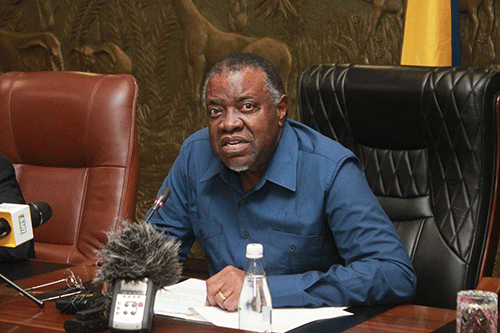President Hage Geingob last week cautioned the nation against the introduction of the universal basic income grant (BIG) under its principle of equal distribution, whether for poor or rich. In efforts to alleviate poverty, many in society are advocating for a BIG to enable the most vulnerable to see some light during dark economic times.
Answering questions on whether government has the capacity to implement BIG, Geingob said the economy is already reeling from the depression, and it makes no sense for a BIG to cater for everyone, even if the government had funds.
A basic tenet of the BIG would be for each citizen to receive an equal amount. “Why should it be everybody getting the amount? Why don’t we look at needs; why should I get the same as the person in Katutura in the street? Does it make sense?” he questioned.
The President further noted that those with abilities should be provided with facilities and conducive environments which they could use to generate their own income so that government only concentrates on the needy and poor.
At the Covid-19 briefing last week, Geingob said instead of a universal BIG, the ongoing food bank initiative, marginalised grants and feeding schemes will be consolidated into a modified basic income grant.
After the recent civil unrest in neighbouring South Africa, President Cyril Ramaphosa reinstated a R350 Social Relief of Distress Grant (SRD), which was paid to unemployed South Africans from May last year until January 2021 to cushion against the impact of the Covid-19 pandemic.
The Basic Income Grant (BIG) Coalition of Namibia, spearheaded by the Economic and Social Justice Trust, earlier said: “We would like to applaud President Ramaphosa for at least taking such a step to try to find a solution to the widespread poverty in South Africa. This was exacerbated by the Covid-19 pandemic that led to many job and income losses. We would like to call on President Geingob to follow the example of his counterpart, and to even go a step further by implementing an unconditional/no-strings attached BIG of N$500 per person per month to Namibians aged 19-59. This would be an important step towards protecting citizens against the cruelty of the widespread poverty and inequality that have been ravaging many Namibians.”
The coalition further pointed out that the World Bank has estimated Namibia’s 2020 poverty rate to be at 64% due to the Covid-19 pandemic. A recent UN report concluded that 800 000 Namibians are facing hunger.
At the onset of the Covid-19 pandemic, the BIG Coalition advised Geingob to implement an unconditional BIG to cushion the impact of the disease. The BIG Coalition stated: “Not only will BIG be a relief measure for the poor to be able to afford basic necessities to live decently, but it is also an economic stimulus policy which would increase money in circulation, leading to increased demand for local goods and services, and sales tax revenue for government, thereby boosting economic growth. This makes BIG by far the most efficient economic recovery policy that Namibia can implement…In comparison to South Africa, Namibia has a small population, and government can certainly afford to pay a BIG of N$500 per person per month to Namibians aged 19-59.”
In a statement issued on Friday, the BIG Coalition admitted that it is aware that the South African SRD grant requires means testing, and is therefore not an ideal measure for tackling widespread poverty that is experienced in South Africa and equally in Namibia.
“Means testing will mean that many of the intended vulnerable recipients won’t benefit as they by nature are the most disadvantaged in terms of access to information, infrastructure and administrative services. It is against this background that a universal grant is needed to reach everybody affected by widespread poverty” the BIG Coalition’s statement read.
During the announcement of the return of the SRD grant, President Ramaphosa said “No country can expect its economy to grow, or to live in peace and harmony, while many of its citizens remain marginalised, hungry and excluded.”
Meanwhile, the BIG Coalition of Namibia is insistent that lessons from South Africa and around the world show that poverty and inequality are incentives for instability, civil discontent and unrest.
“Hence, the BIG Coalition is urging President Geingob to seriously consider implementing an unconditional BIG to prevent desperation and mass discontent as experienced by South Africa during the past month”.
At last week’s Covid briefing, Prime Minister (PM) Saara Kuugongelwa-Amadhila also stated that government is working tirelessly to get businesses back on track with many different initiatives as well as through the cooperation of financial institutions in the country.
She said in this vein, companies that have been negatively affected should not bear the brunt of being penalised. The PM added that it would be necessary for financial institutions to support the solvency and liquidity of companies to which funding has been allocated. This is because government wants to confirm that allocated funds are indeed being used to assist with economic recovery.
“The company must be in a position to undertake productive activities when it receives these funds. If there are specific challenges with regards to providing the information required to receive the funds, then my advice is for this to be undertaken with these institutions or with the finance ministry,” added Kuugongelwa-Amadhila.


